HND Business: Entrepreneurship & Small Business Management Report
VerifiedAdded on 2023/06/18
|13
|3309
|331
Report
AI Summary
This report provides a comprehensive overview of entrepreneurship and small business management, covering various aspects such as types of entrepreneurial ventures, their similarities and differences, the impact of micro and small businesses on the economy, and the importance of small businesses and start-ups. It also delves into the characteristic traits and skills of successful entrepreneurs and how their entrepreneurial personality reflects their motivation and mindset. The report further explores how background and experience can either hinder or foster entrepreneurship, providing a holistic understanding of the entrepreneurial landscape. Desklib offers a wide range of study resources, including past papers and solved assignments, to support students in their academic journey.

Entrepreneurship and Small
Business Management
Business Management
Paraphrase This Document
Need a fresh take? Get an instant paraphrase of this document with our AI Paraphraser
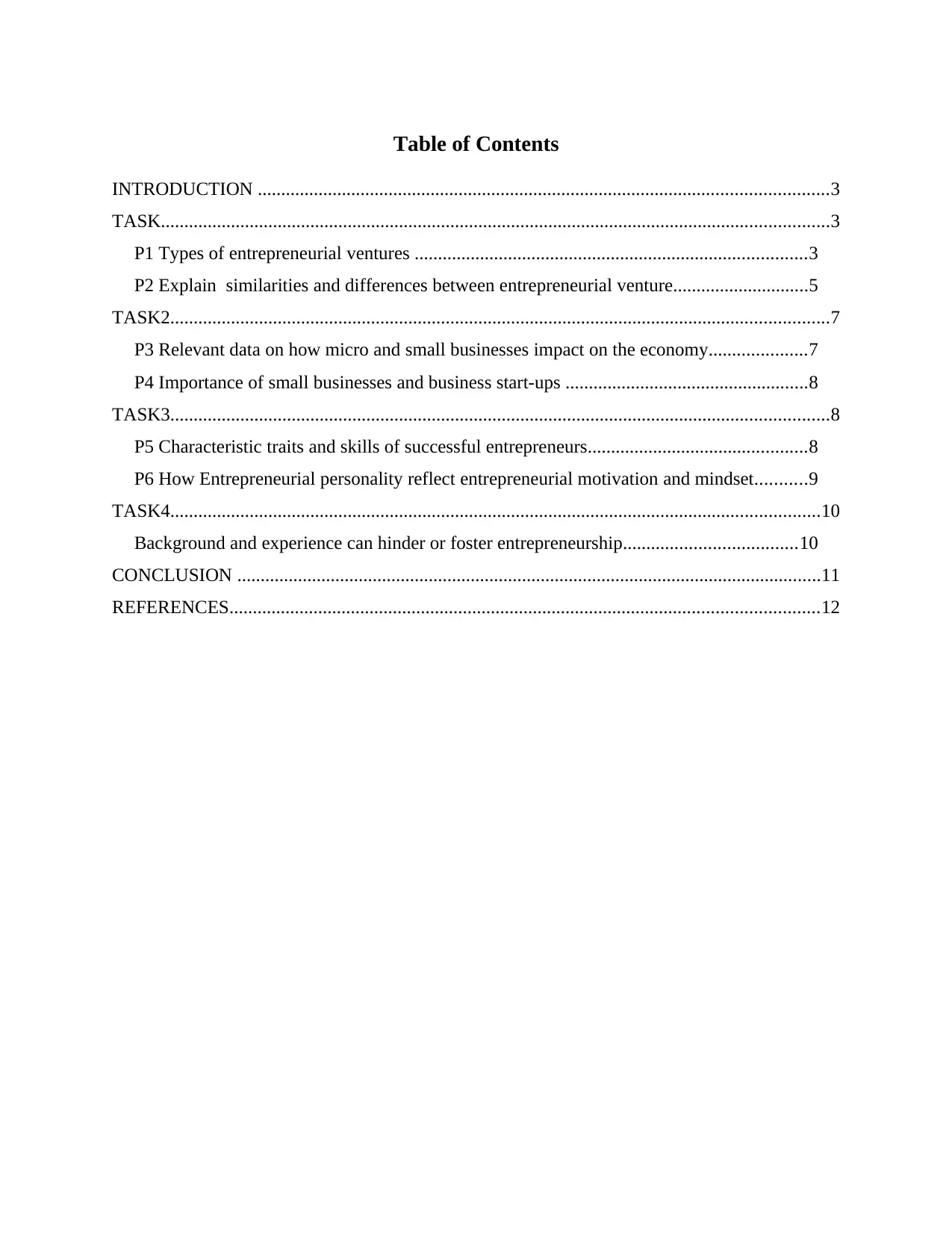
Table of Contents
INTRODUCTION ..........................................................................................................................3
TASK...............................................................................................................................................3
P1 Types of entrepreneurial ventures ....................................................................................3
P2 Explain similarities and differences between entrepreneurial venture.............................5
TASK2.............................................................................................................................................7
P3 Relevant data on how micro and small businesses impact on the economy.....................7
P4 Importance of small businesses and business start-ups ....................................................8
TASK3.............................................................................................................................................8
P5 Characteristic traits and skills of successful entrepreneurs...............................................8
P6 How Entrepreneurial personality reflect entrepreneurial motivation and mindset...........9
TASK4...........................................................................................................................................10
Background and experience can hinder or foster entrepreneurship.....................................10
CONCLUSION .............................................................................................................................11
REFERENCES..............................................................................................................................12
INTRODUCTION ..........................................................................................................................3
TASK...............................................................................................................................................3
P1 Types of entrepreneurial ventures ....................................................................................3
P2 Explain similarities and differences between entrepreneurial venture.............................5
TASK2.............................................................................................................................................7
P3 Relevant data on how micro and small businesses impact on the economy.....................7
P4 Importance of small businesses and business start-ups ....................................................8
TASK3.............................................................................................................................................8
P5 Characteristic traits and skills of successful entrepreneurs...............................................8
P6 How Entrepreneurial personality reflect entrepreneurial motivation and mindset...........9
TASK4...........................................................................................................................................10
Background and experience can hinder or foster entrepreneurship.....................................10
CONCLUSION .............................................................................................................................11
REFERENCES..............................................................................................................................12
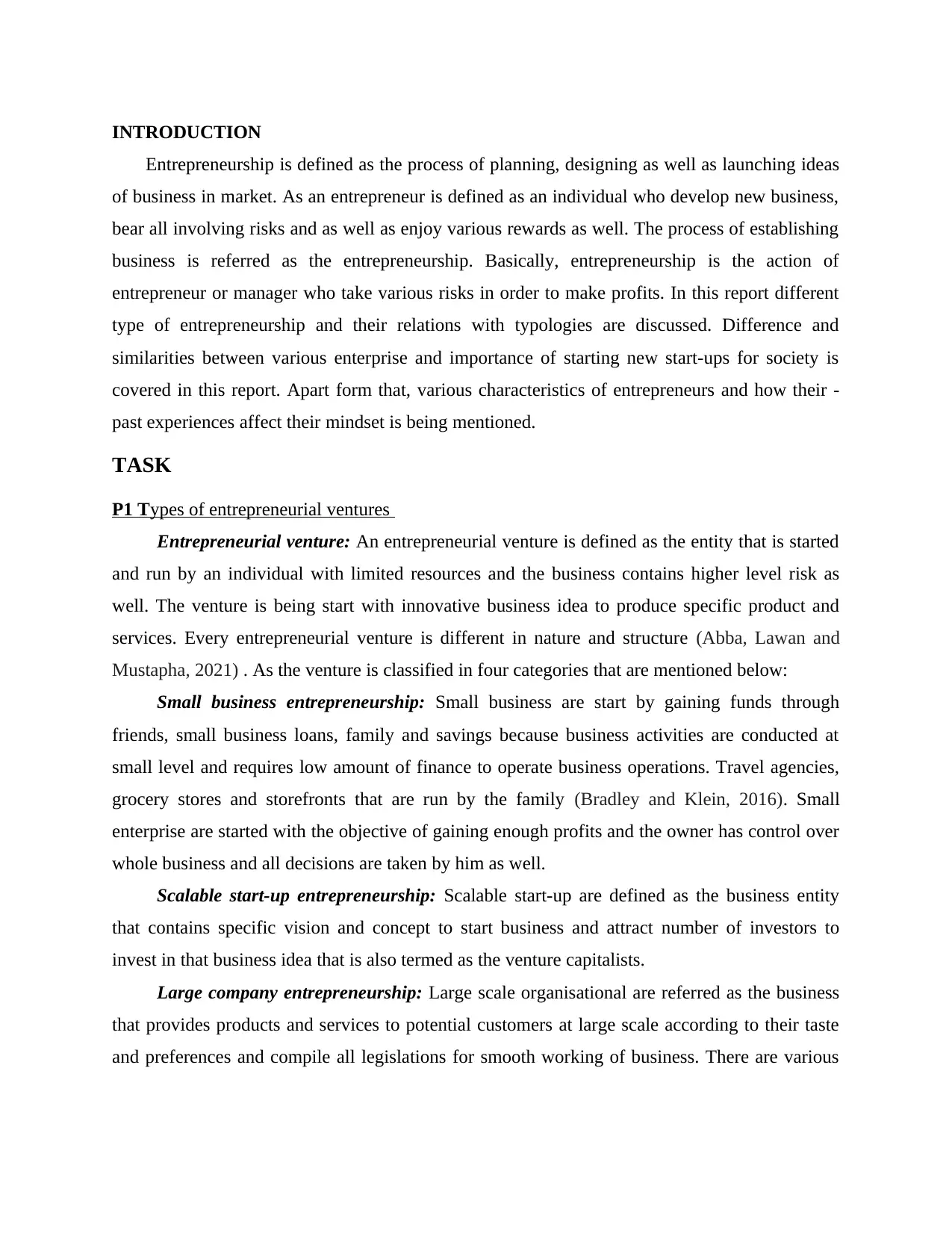
INTRODUCTION
Entrepreneurship is defined as the process of planning, designing as well as launching ideas
of business in market. As an entrepreneur is defined as an individual who develop new business,
bear all involving risks and as well as enjoy various rewards as well. The process of establishing
business is referred as the entrepreneurship. Basically, entrepreneurship is the action of
entrepreneur or manager who take various risks in order to make profits. In this report different
type of entrepreneurship and their relations with typologies are discussed. Difference and
similarities between various enterprise and importance of starting new start-ups for society is
covered in this report. Apart form that, various characteristics of entrepreneurs and how their -
past experiences affect their mindset is being mentioned.
TASK
P1 Types of entrepreneurial ventures
Entrepreneurial venture: An entrepreneurial venture is defined as the entity that is started
and run by an individual with limited resources and the business contains higher level risk as
well. The venture is being start with innovative business idea to produce specific product and
services. Every entrepreneurial venture is different in nature and structure (Abba, Lawan and
Mustapha, 2021) . As the venture is classified in four categories that are mentioned below:
Small business entrepreneurship: Small business are start by gaining funds through
friends, small business loans, family and savings because business activities are conducted at
small level and requires low amount of finance to operate business operations. Travel agencies,
grocery stores and storefronts that are run by the family (Bradley and Klein, 2016). Small
enterprise are started with the objective of gaining enough profits and the owner has control over
whole business and all decisions are taken by him as well.
Scalable start-up entrepreneurship: Scalable start-up are defined as the business entity
that contains specific vision and concept to start business and attract number of investors to
invest in that business idea that is also termed as the venture capitalists.
Large company entrepreneurship: Large scale organisational are referred as the business
that provides products and services to potential customers at large scale according to their taste
and preferences and compile all legislations for smooth working of business. There are various
Entrepreneurship is defined as the process of planning, designing as well as launching ideas
of business in market. As an entrepreneur is defined as an individual who develop new business,
bear all involving risks and as well as enjoy various rewards as well. The process of establishing
business is referred as the entrepreneurship. Basically, entrepreneurship is the action of
entrepreneur or manager who take various risks in order to make profits. In this report different
type of entrepreneurship and their relations with typologies are discussed. Difference and
similarities between various enterprise and importance of starting new start-ups for society is
covered in this report. Apart form that, various characteristics of entrepreneurs and how their -
past experiences affect their mindset is being mentioned.
TASK
P1 Types of entrepreneurial ventures
Entrepreneurial venture: An entrepreneurial venture is defined as the entity that is started
and run by an individual with limited resources and the business contains higher level risk as
well. The venture is being start with innovative business idea to produce specific product and
services. Every entrepreneurial venture is different in nature and structure (Abba, Lawan and
Mustapha, 2021) . As the venture is classified in four categories that are mentioned below:
Small business entrepreneurship: Small business are start by gaining funds through
friends, small business loans, family and savings because business activities are conducted at
small level and requires low amount of finance to operate business operations. Travel agencies,
grocery stores and storefronts that are run by the family (Bradley and Klein, 2016). Small
enterprise are started with the objective of gaining enough profits and the owner has control over
whole business and all decisions are taken by him as well.
Scalable start-up entrepreneurship: Scalable start-up are defined as the business entity
that contains specific vision and concept to start business and attract number of investors to
invest in that business idea that is also termed as the venture capitalists.
Large company entrepreneurship: Large scale organisational are referred as the business
that provides products and services to potential customers at large scale according to their taste
and preferences and compile all legislations for smooth working of business. There are various
⊘ This is a preview!⊘
Do you want full access?
Subscribe today to unlock all pages.

Trusted by 1+ million students worldwide
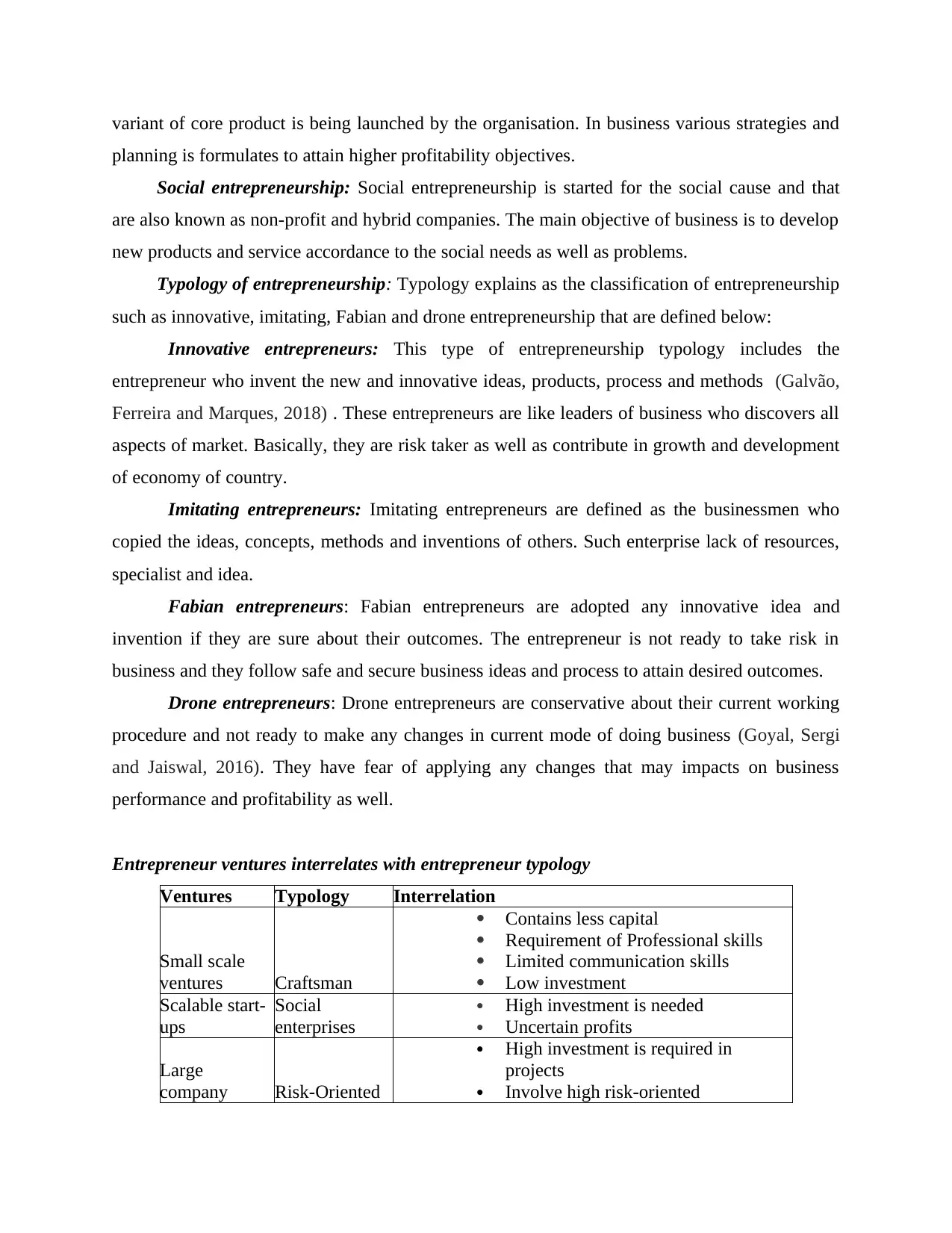
variant of core product is being launched by the organisation. In business various strategies and
planning is formulates to attain higher profitability objectives.
Social entrepreneurship: Social entrepreneurship is started for the social cause and that
are also known as non-profit and hybrid companies. The main objective of business is to develop
new products and service accordance to the social needs as well as problems.
Typology of entrepreneurship: Typology explains as the classification of entrepreneurship
such as innovative, imitating, Fabian and drone entrepreneurship that are defined below:
Innovative entrepreneurs: This type of entrepreneurship typology includes the
entrepreneur who invent the new and innovative ideas, products, process and methods (Galvão,
Ferreira and Marques, 2018) . These entrepreneurs are like leaders of business who discovers all
aspects of market. Basically, they are risk taker as well as contribute in growth and development
of economy of country.
Imitating entrepreneurs: Imitating entrepreneurs are defined as the businessmen who
copied the ideas, concepts, methods and inventions of others. Such enterprise lack of resources,
specialist and idea.
Fabian entrepreneurs: Fabian entrepreneurs are adopted any innovative idea and
invention if they are sure about their outcomes. The entrepreneur is not ready to take risk in
business and they follow safe and secure business ideas and process to attain desired outcomes.
Drone entrepreneurs: Drone entrepreneurs are conservative about their current working
procedure and not ready to make any changes in current mode of doing business (Goyal, Sergi
and Jaiswal, 2016). They have fear of applying any changes that may impacts on business
performance and profitability as well.
Entrepreneur ventures interrelates with entrepreneur typology
Ventures Typology Interrelation
Small scale
ventures Craftsman
Contains less capital
Requirement of Professional skills
Limited communication skills
Low investment
Scalable start-
ups
Social
enterprises
High investment is needed
Uncertain profits
Large
company Risk-Oriented
High investment is required in
projects
Involve high risk-oriented
planning is formulates to attain higher profitability objectives.
Social entrepreneurship: Social entrepreneurship is started for the social cause and that
are also known as non-profit and hybrid companies. The main objective of business is to develop
new products and service accordance to the social needs as well as problems.
Typology of entrepreneurship: Typology explains as the classification of entrepreneurship
such as innovative, imitating, Fabian and drone entrepreneurship that are defined below:
Innovative entrepreneurs: This type of entrepreneurship typology includes the
entrepreneur who invent the new and innovative ideas, products, process and methods (Galvão,
Ferreira and Marques, 2018) . These entrepreneurs are like leaders of business who discovers all
aspects of market. Basically, they are risk taker as well as contribute in growth and development
of economy of country.
Imitating entrepreneurs: Imitating entrepreneurs are defined as the businessmen who
copied the ideas, concepts, methods and inventions of others. Such enterprise lack of resources,
specialist and idea.
Fabian entrepreneurs: Fabian entrepreneurs are adopted any innovative idea and
invention if they are sure about their outcomes. The entrepreneur is not ready to take risk in
business and they follow safe and secure business ideas and process to attain desired outcomes.
Drone entrepreneurs: Drone entrepreneurs are conservative about their current working
procedure and not ready to make any changes in current mode of doing business (Goyal, Sergi
and Jaiswal, 2016). They have fear of applying any changes that may impacts on business
performance and profitability as well.
Entrepreneur ventures interrelates with entrepreneur typology
Ventures Typology Interrelation
Small scale
ventures Craftsman
Contains less capital
Requirement of Professional skills
Limited communication skills
Low investment
Scalable start-
ups
Social
enterprises
High investment is needed
Uncertain profits
Large
company Risk-Oriented
High investment is required in
projects
Involve high risk-oriented
Paraphrase This Document
Need a fresh take? Get an instant paraphrase of this document with our AI Paraphraser
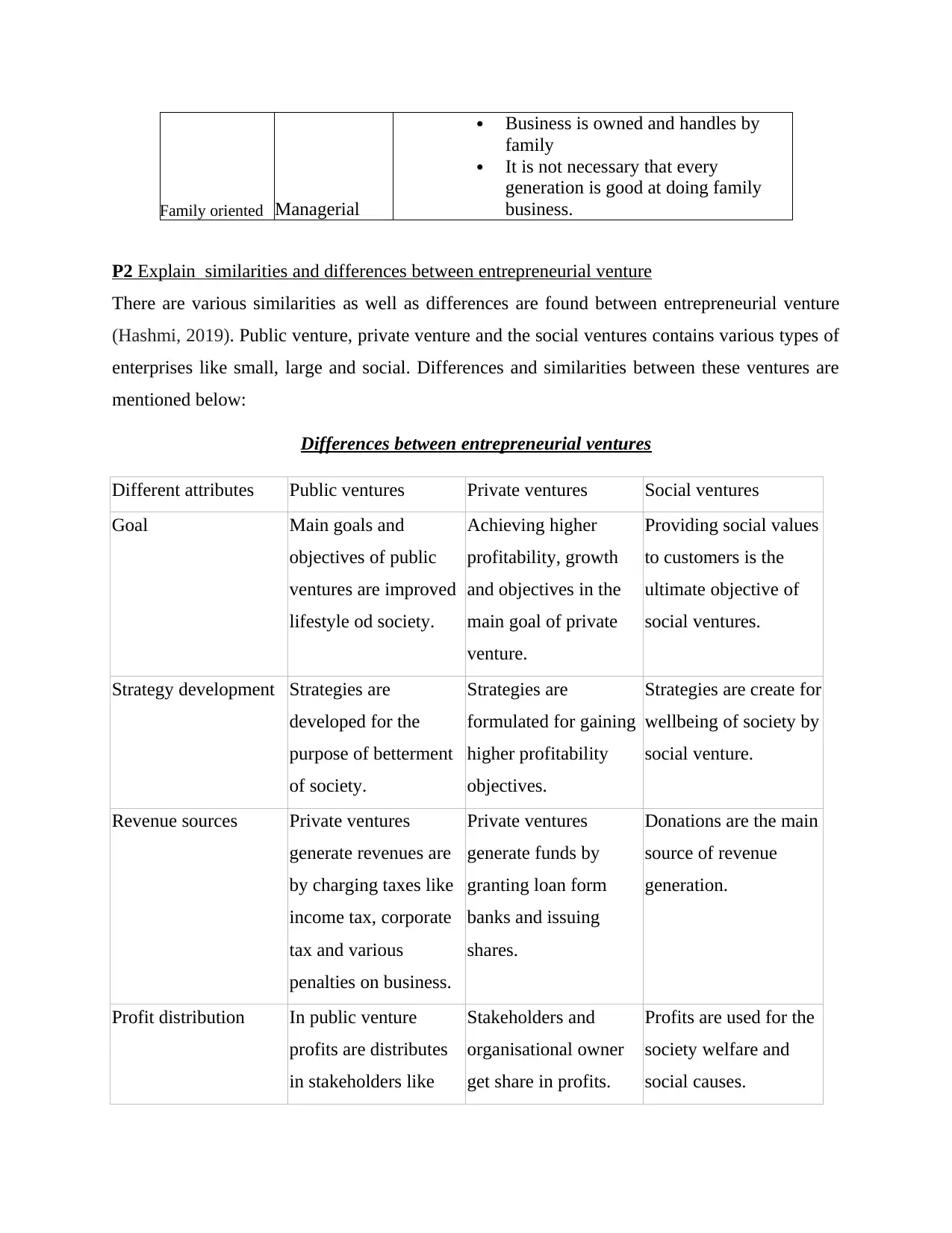
Family oriented Managerial
Business is owned and handles by
family
It is not necessary that every
generation is good at doing family
business.
P2 Explain similarities and differences between entrepreneurial venture
There are various similarities as well as differences are found between entrepreneurial venture
(Hashmi, 2019). Public venture, private venture and the social ventures contains various types of
enterprises like small, large and social. Differences and similarities between these ventures are
mentioned below:
Differences between entrepreneurial ventures
Different attributes Public ventures Private ventures Social ventures
Goal Main goals and
objectives of public
ventures are improved
lifestyle od society.
Achieving higher
profitability, growth
and objectives in the
main goal of private
venture.
Providing social values
to customers is the
ultimate objective of
social ventures.
Strategy development Strategies are
developed for the
purpose of betterment
of society.
Strategies are
formulated for gaining
higher profitability
objectives.
Strategies are create for
wellbeing of society by
social venture.
Revenue sources Private ventures
generate revenues are
by charging taxes like
income tax, corporate
tax and various
penalties on business.
Private ventures
generate funds by
granting loan form
banks and issuing
shares.
Donations are the main
source of revenue
generation.
Profit distribution In public venture
profits are distributes
in stakeholders like
Stakeholders and
organisational owner
get share in profits.
Profits are used for the
society welfare and
social causes.
Business is owned and handles by
family
It is not necessary that every
generation is good at doing family
business.
P2 Explain similarities and differences between entrepreneurial venture
There are various similarities as well as differences are found between entrepreneurial venture
(Hashmi, 2019). Public venture, private venture and the social ventures contains various types of
enterprises like small, large and social. Differences and similarities between these ventures are
mentioned below:
Differences between entrepreneurial ventures
Different attributes Public ventures Private ventures Social ventures
Goal Main goals and
objectives of public
ventures are improved
lifestyle od society.
Achieving higher
profitability, growth
and objectives in the
main goal of private
venture.
Providing social values
to customers is the
ultimate objective of
social ventures.
Strategy development Strategies are
developed for the
purpose of betterment
of society.
Strategies are
formulated for gaining
higher profitability
objectives.
Strategies are create for
wellbeing of society by
social venture.
Revenue sources Private ventures
generate revenues are
by charging taxes like
income tax, corporate
tax and various
penalties on business.
Private ventures
generate funds by
granting loan form
banks and issuing
shares.
Donations are the main
source of revenue
generation.
Profit distribution In public venture
profits are distributes
in stakeholders like
Stakeholders and
organisational owner
get share in profits.
Profits are used for the
society welfare and
social causes.
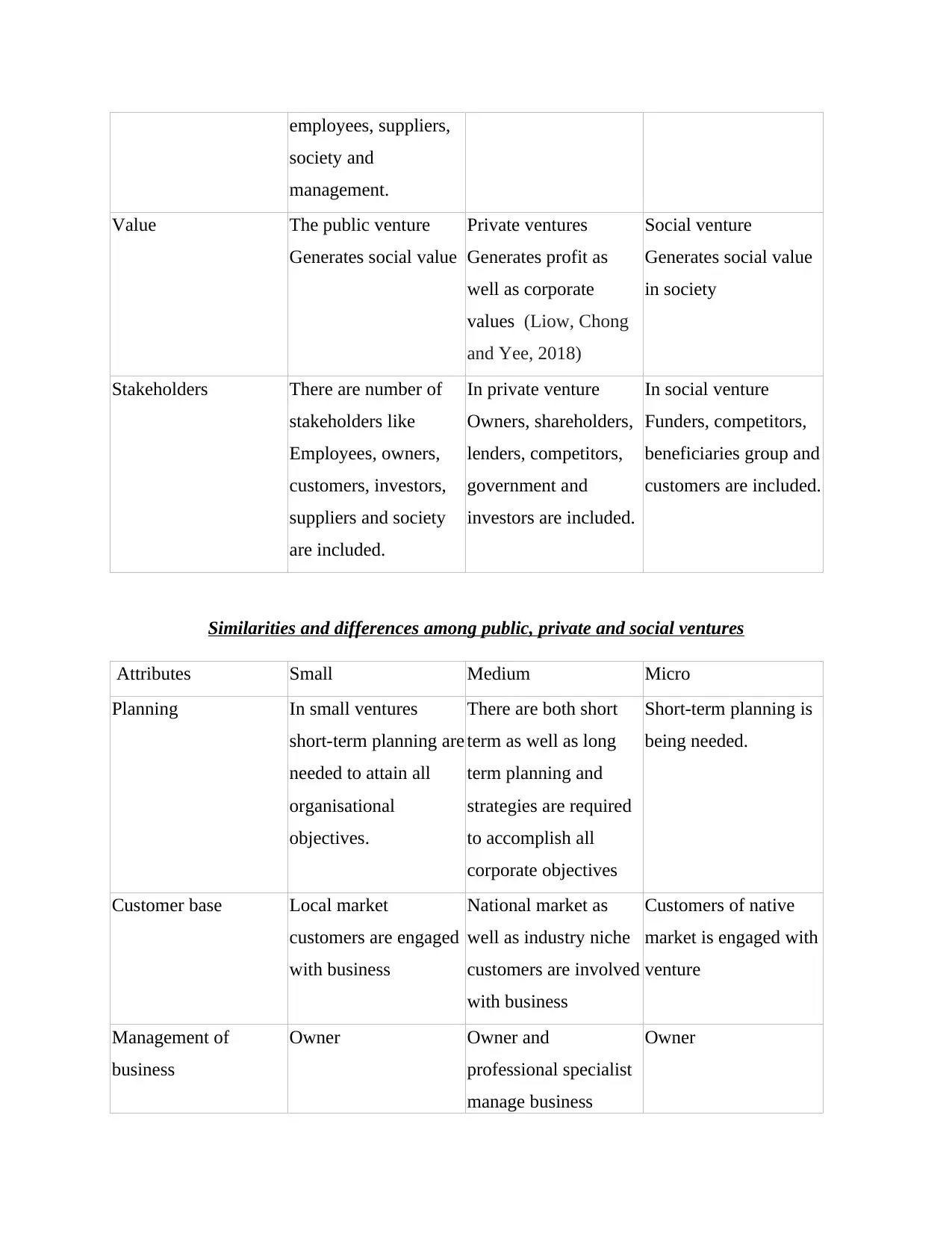
employees, suppliers,
society and
management.
Value The public venture
Generates social value
Private ventures
Generates profit as
well as corporate
values (Liow, Chong
and Yee, 2018)
Social venture
Generates social value
in society
Stakeholders There are number of
stakeholders like
Employees, owners,
customers, investors,
suppliers and society
are included.
In private venture
Owners, shareholders,
lenders, competitors,
government and
investors are included.
In social venture
Funders, competitors,
beneficiaries group and
customers are included.
Similarities and differences among public, private and social ventures
Attributes Small Medium Micro
Planning In small ventures
short-term planning are
needed to attain all
organisational
objectives.
There are both short
term as well as long
term planning and
strategies are required
to accomplish all
corporate objectives
Short-term planning is
being needed.
Customer base Local market
customers are engaged
with business
National market as
well as industry niche
customers are involved
with business
Customers of native
market is engaged with
venture
Management of
business
Owner Owner and
professional specialist
manage business
Owner
society and
management.
Value The public venture
Generates social value
Private ventures
Generates profit as
well as corporate
values (Liow, Chong
and Yee, 2018)
Social venture
Generates social value
in society
Stakeholders There are number of
stakeholders like
Employees, owners,
customers, investors,
suppliers and society
are included.
In private venture
Owners, shareholders,
lenders, competitors,
government and
investors are included.
In social venture
Funders, competitors,
beneficiaries group and
customers are included.
Similarities and differences among public, private and social ventures
Attributes Small Medium Micro
Planning In small ventures
short-term planning are
needed to attain all
organisational
objectives.
There are both short
term as well as long
term planning and
strategies are required
to accomplish all
corporate objectives
Short-term planning is
being needed.
Customer base Local market
customers are engaged
with business
National market as
well as industry niche
customers are involved
with business
Customers of native
market is engaged with
venture
Management of
business
Owner Owner and
professional specialist
manage business
Owner
⊘ This is a preview!⊘
Do you want full access?
Subscribe today to unlock all pages.

Trusted by 1+ million students worldwide
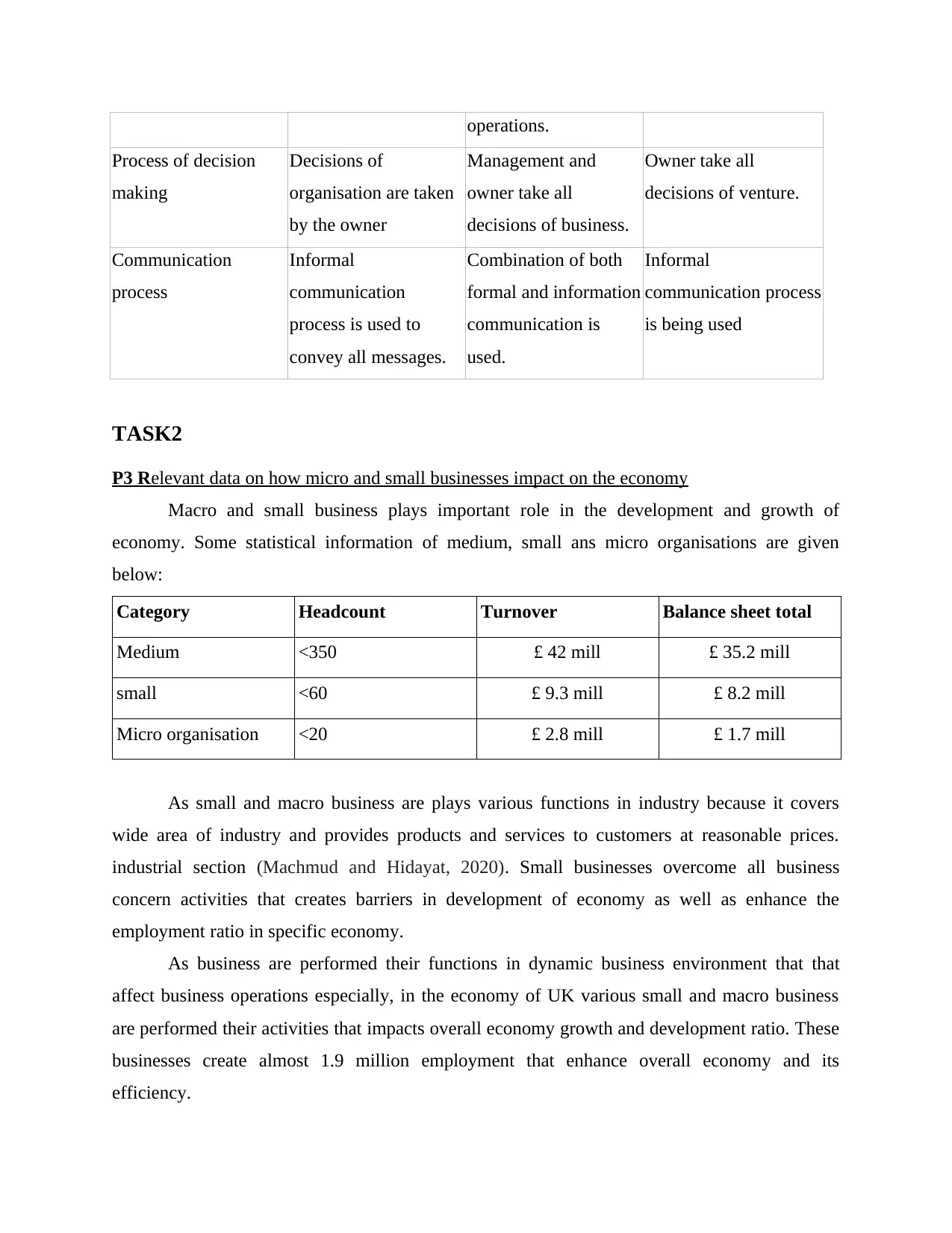
operations.
Process of decision
making
Decisions of
organisation are taken
by the owner
Management and
owner take all
decisions of business.
Owner take all
decisions of venture.
Communication
process
Informal
communication
process is used to
convey all messages.
Combination of both
formal and information
communication is
used.
Informal
communication process
is being used
TASK2
P3 Relevant data on how micro and small businesses impact on the economy
Macro and small business plays important role in the development and growth of
economy. Some statistical information of medium, small ans micro organisations are given
below:
Category Headcount Turnover Balance sheet total
Medium <350 £ 42 mill £ 35.2 mill
small <60 £ 9.3 mill £ 8.2 mill
Micro organisation <20 £ 2.8 mill £ 1.7 mill
As small and macro business are plays various functions in industry because it covers
wide area of industry and provides products and services to customers at reasonable prices.
industrial section (Machmud and Hidayat, 2020). Small businesses overcome all business
concern activities that creates barriers in development of economy as well as enhance the
employment ratio in specific economy.
As business are performed their functions in dynamic business environment that that
affect business operations especially, in the economy of UK various small and macro business
are performed their activities that impacts overall economy growth and development ratio. These
businesses create almost 1.9 million employment that enhance overall economy and its
efficiency.
Process of decision
making
Decisions of
organisation are taken
by the owner
Management and
owner take all
decisions of business.
Owner take all
decisions of venture.
Communication
process
Informal
communication
process is used to
convey all messages.
Combination of both
formal and information
communication is
used.
Informal
communication process
is being used
TASK2
P3 Relevant data on how micro and small businesses impact on the economy
Macro and small business plays important role in the development and growth of
economy. Some statistical information of medium, small ans micro organisations are given
below:
Category Headcount Turnover Balance sheet total
Medium <350 £ 42 mill £ 35.2 mill
small <60 £ 9.3 mill £ 8.2 mill
Micro organisation <20 £ 2.8 mill £ 1.7 mill
As small and macro business are plays various functions in industry because it covers
wide area of industry and provides products and services to customers at reasonable prices.
industrial section (Machmud and Hidayat, 2020). Small businesses overcome all business
concern activities that creates barriers in development of economy as well as enhance the
employment ratio in specific economy.
As business are performed their functions in dynamic business environment that that
affect business operations especially, in the economy of UK various small and macro business
are performed their activities that impacts overall economy growth and development ratio. These
businesses create almost 1.9 million employment that enhance overall economy and its
efficiency.
Paraphrase This Document
Need a fresh take? Get an instant paraphrase of this document with our AI Paraphraser
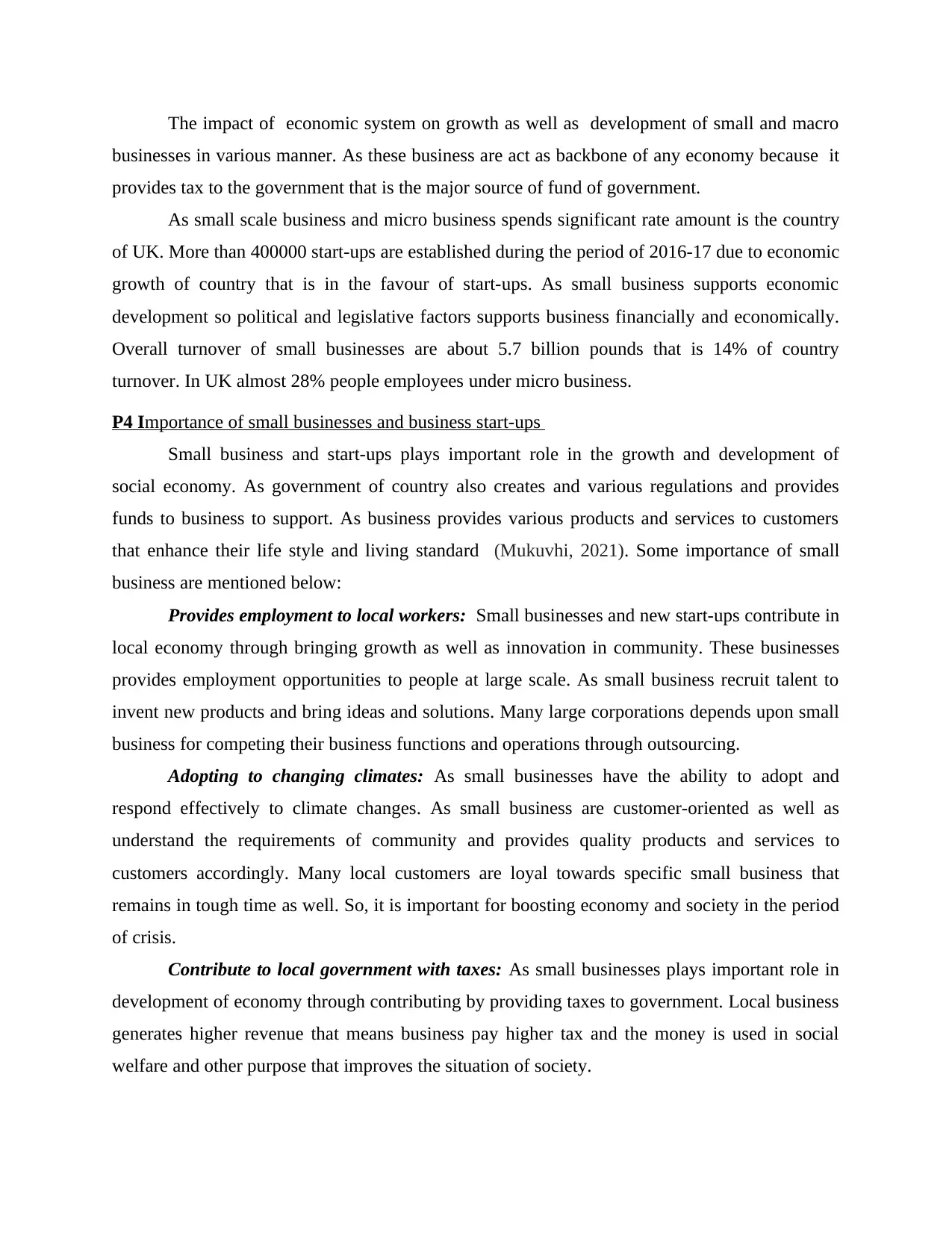
The impact of economic system on growth as well as development of small and macro
businesses in various manner. As these business are act as backbone of any economy because it
provides tax to the government that is the major source of fund of government.
As small scale business and micro business spends significant rate amount is the country
of UK. More than 400000 start-ups are established during the period of 2016-17 due to economic
growth of country that is in the favour of start-ups. As small business supports economic
development so political and legislative factors supports business financially and economically.
Overall turnover of small businesses are about 5.7 billion pounds that is 14% of country
turnover. In UK almost 28% people employees under micro business.
P4 Importance of small businesses and business start-ups
Small business and start-ups plays important role in the growth and development of
social economy. As government of country also creates and various regulations and provides
funds to business to support. As business provides various products and services to customers
that enhance their life style and living standard (Mukuvhi, 2021). Some importance of small
business are mentioned below:
Provides employment to local workers: Small businesses and new start-ups contribute in
local economy through bringing growth as well as innovation in community. These businesses
provides employment opportunities to people at large scale. As small business recruit talent to
invent new products and bring ideas and solutions. Many large corporations depends upon small
business for competing their business functions and operations through outsourcing.
Adopting to changing climates: As small businesses have the ability to adopt and
respond effectively to climate changes. As small business are customer-oriented as well as
understand the requirements of community and provides quality products and services to
customers accordingly. Many local customers are loyal towards specific small business that
remains in tough time as well. So, it is important for boosting economy and society in the period
of crisis.
Contribute to local government with taxes: As small businesses plays important role in
development of economy through contributing by providing taxes to government. Local business
generates higher revenue that means business pay higher tax and the money is used in social
welfare and other purpose that improves the situation of society.
businesses in various manner. As these business are act as backbone of any economy because it
provides tax to the government that is the major source of fund of government.
As small scale business and micro business spends significant rate amount is the country
of UK. More than 400000 start-ups are established during the period of 2016-17 due to economic
growth of country that is in the favour of start-ups. As small business supports economic
development so political and legislative factors supports business financially and economically.
Overall turnover of small businesses are about 5.7 billion pounds that is 14% of country
turnover. In UK almost 28% people employees under micro business.
P4 Importance of small businesses and business start-ups
Small business and start-ups plays important role in the growth and development of
social economy. As government of country also creates and various regulations and provides
funds to business to support. As business provides various products and services to customers
that enhance their life style and living standard (Mukuvhi, 2021). Some importance of small
business are mentioned below:
Provides employment to local workers: Small businesses and new start-ups contribute in
local economy through bringing growth as well as innovation in community. These businesses
provides employment opportunities to people at large scale. As small business recruit talent to
invent new products and bring ideas and solutions. Many large corporations depends upon small
business for competing their business functions and operations through outsourcing.
Adopting to changing climates: As small businesses have the ability to adopt and
respond effectively to climate changes. As small business are customer-oriented as well as
understand the requirements of community and provides quality products and services to
customers accordingly. Many local customers are loyal towards specific small business that
remains in tough time as well. So, it is important for boosting economy and society in the period
of crisis.
Contribute to local government with taxes: As small businesses plays important role in
development of economy through contributing by providing taxes to government. Local business
generates higher revenue that means business pay higher tax and the money is used in social
welfare and other purpose that improves the situation of society.
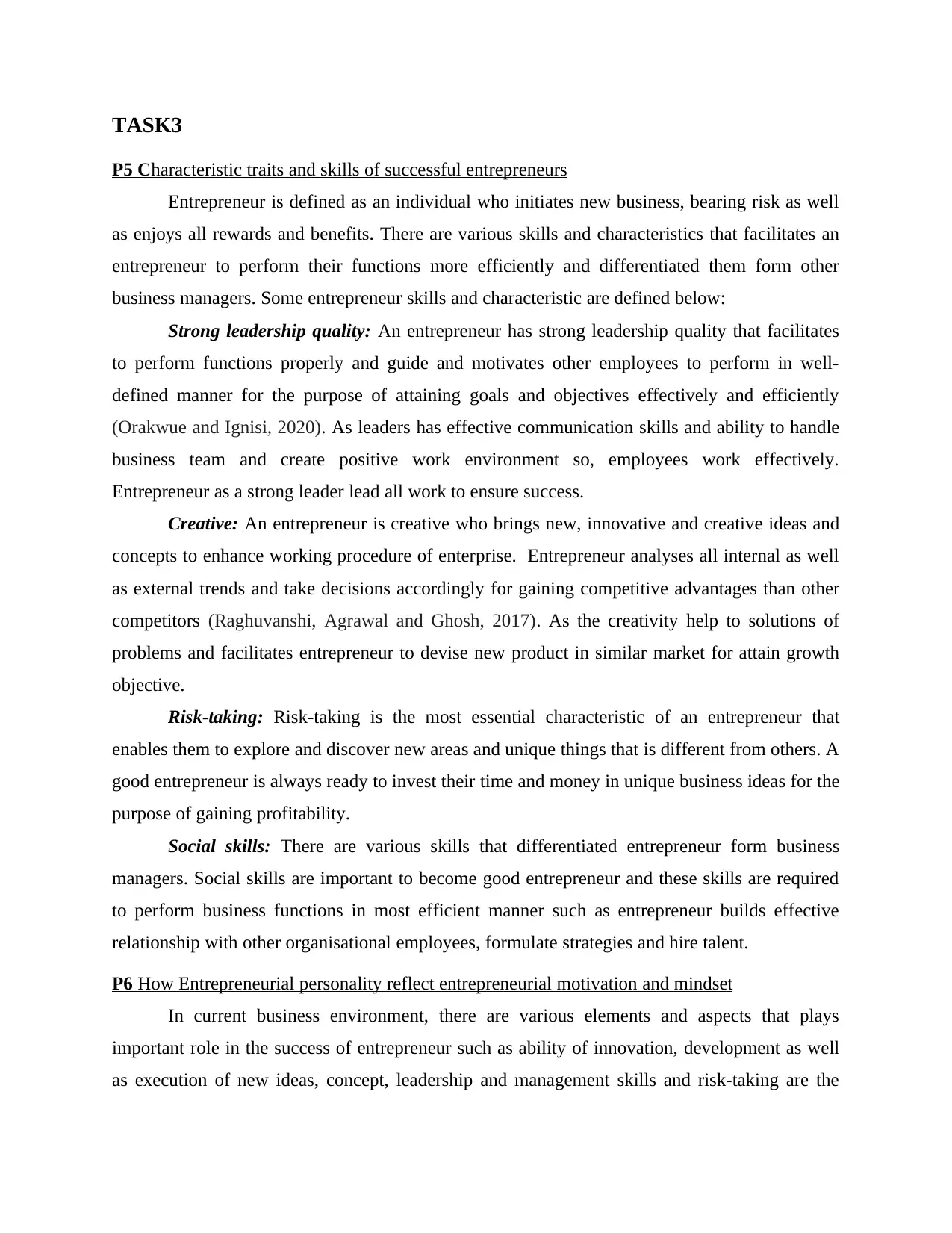
TASK3
P5 Characteristic traits and skills of successful entrepreneurs
Entrepreneur is defined as an individual who initiates new business, bearing risk as well
as enjoys all rewards and benefits. There are various skills and characteristics that facilitates an
entrepreneur to perform their functions more efficiently and differentiated them form other
business managers. Some entrepreneur skills and characteristic are defined below:
Strong leadership quality: An entrepreneur has strong leadership quality that facilitates
to perform functions properly and guide and motivates other employees to perform in well-
defined manner for the purpose of attaining goals and objectives effectively and efficiently
(Orakwue and Ignisi, 2020). As leaders has effective communication skills and ability to handle
business team and create positive work environment so, employees work effectively.
Entrepreneur as a strong leader lead all work to ensure success.
Creative: An entrepreneur is creative who brings new, innovative and creative ideas and
concepts to enhance working procedure of enterprise. Entrepreneur analyses all internal as well
as external trends and take decisions accordingly for gaining competitive advantages than other
competitors (Raghuvanshi, Agrawal and Ghosh, 2017). As the creativity help to solutions of
problems and facilitates entrepreneur to devise new product in similar market for attain growth
objective.
Risk-taking: Risk-taking is the most essential characteristic of an entrepreneur that
enables them to explore and discover new areas and unique things that is different from others. A
good entrepreneur is always ready to invest their time and money in unique business ideas for the
purpose of gaining profitability.
Social skills: There are various skills that differentiated entrepreneur form business
managers. Social skills are important to become good entrepreneur and these skills are required
to perform business functions in most efficient manner such as entrepreneur builds effective
relationship with other organisational employees, formulate strategies and hire talent.
P6 How Entrepreneurial personality reflect entrepreneurial motivation and mindset
In current business environment, there are various elements and aspects that plays
important role in the success of entrepreneur such as ability of innovation, development as well
as execution of new ideas, concept, leadership and management skills and risk-taking are the
P5 Characteristic traits and skills of successful entrepreneurs
Entrepreneur is defined as an individual who initiates new business, bearing risk as well
as enjoys all rewards and benefits. There are various skills and characteristics that facilitates an
entrepreneur to perform their functions more efficiently and differentiated them form other
business managers. Some entrepreneur skills and characteristic are defined below:
Strong leadership quality: An entrepreneur has strong leadership quality that facilitates
to perform functions properly and guide and motivates other employees to perform in well-
defined manner for the purpose of attaining goals and objectives effectively and efficiently
(Orakwue and Ignisi, 2020). As leaders has effective communication skills and ability to handle
business team and create positive work environment so, employees work effectively.
Entrepreneur as a strong leader lead all work to ensure success.
Creative: An entrepreneur is creative who brings new, innovative and creative ideas and
concepts to enhance working procedure of enterprise. Entrepreneur analyses all internal as well
as external trends and take decisions accordingly for gaining competitive advantages than other
competitors (Raghuvanshi, Agrawal and Ghosh, 2017). As the creativity help to solutions of
problems and facilitates entrepreneur to devise new product in similar market for attain growth
objective.
Risk-taking: Risk-taking is the most essential characteristic of an entrepreneur that
enables them to explore and discover new areas and unique things that is different from others. A
good entrepreneur is always ready to invest their time and money in unique business ideas for the
purpose of gaining profitability.
Social skills: There are various skills that differentiated entrepreneur form business
managers. Social skills are important to become good entrepreneur and these skills are required
to perform business functions in most efficient manner such as entrepreneur builds effective
relationship with other organisational employees, formulate strategies and hire talent.
P6 How Entrepreneurial personality reflect entrepreneurial motivation and mindset
In current business environment, there are various elements and aspects that plays
important role in the success of entrepreneur such as ability of innovation, development as well
as execution of new ideas, concept, leadership and management skills and risk-taking are the
⊘ This is a preview!⊘
Do you want full access?
Subscribe today to unlock all pages.

Trusted by 1+ million students worldwide
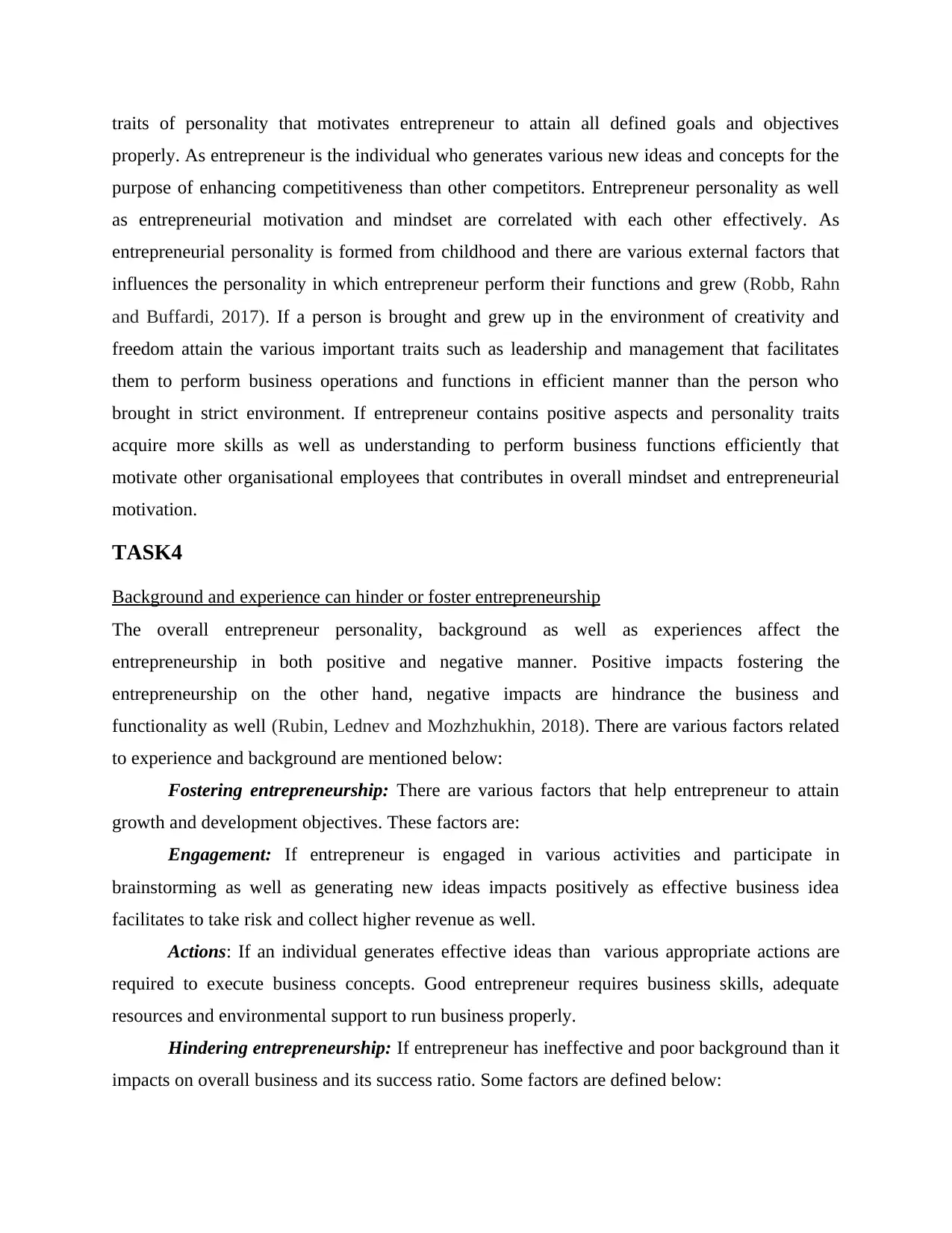
traits of personality that motivates entrepreneur to attain all defined goals and objectives
properly. As entrepreneur is the individual who generates various new ideas and concepts for the
purpose of enhancing competitiveness than other competitors. Entrepreneur personality as well
as entrepreneurial motivation and mindset are correlated with each other effectively. As
entrepreneurial personality is formed from childhood and there are various external factors that
influences the personality in which entrepreneur perform their functions and grew (Robb, Rahn
and Buffardi, 2017). If a person is brought and grew up in the environment of creativity and
freedom attain the various important traits such as leadership and management that facilitates
them to perform business operations and functions in efficient manner than the person who
brought in strict environment. If entrepreneur contains positive aspects and personality traits
acquire more skills as well as understanding to perform business functions efficiently that
motivate other organisational employees that contributes in overall mindset and entrepreneurial
motivation.
TASK4
Background and experience can hinder or foster entrepreneurship
The overall entrepreneur personality, background as well as experiences affect the
entrepreneurship in both positive and negative manner. Positive impacts fostering the
entrepreneurship on the other hand, negative impacts are hindrance the business and
functionality as well (Rubin, Lednev and Mozhzhukhin, 2018). There are various factors related
to experience and background are mentioned below:
Fostering entrepreneurship: There are various factors that help entrepreneur to attain
growth and development objectives. These factors are:
Engagement: If entrepreneur is engaged in various activities and participate in
brainstorming as well as generating new ideas impacts positively as effective business idea
facilitates to take risk and collect higher revenue as well.
Actions: If an individual generates effective ideas than various appropriate actions are
required to execute business concepts. Good entrepreneur requires business skills, adequate
resources and environmental support to run business properly.
Hindering entrepreneurship: If entrepreneur has ineffective and poor background than it
impacts on overall business and its success ratio. Some factors are defined below:
properly. As entrepreneur is the individual who generates various new ideas and concepts for the
purpose of enhancing competitiveness than other competitors. Entrepreneur personality as well
as entrepreneurial motivation and mindset are correlated with each other effectively. As
entrepreneurial personality is formed from childhood and there are various external factors that
influences the personality in which entrepreneur perform their functions and grew (Robb, Rahn
and Buffardi, 2017). If a person is brought and grew up in the environment of creativity and
freedom attain the various important traits such as leadership and management that facilitates
them to perform business operations and functions in efficient manner than the person who
brought in strict environment. If entrepreneur contains positive aspects and personality traits
acquire more skills as well as understanding to perform business functions efficiently that
motivate other organisational employees that contributes in overall mindset and entrepreneurial
motivation.
TASK4
Background and experience can hinder or foster entrepreneurship
The overall entrepreneur personality, background as well as experiences affect the
entrepreneurship in both positive and negative manner. Positive impacts fostering the
entrepreneurship on the other hand, negative impacts are hindrance the business and
functionality as well (Rubin, Lednev and Mozhzhukhin, 2018). There are various factors related
to experience and background are mentioned below:
Fostering entrepreneurship: There are various factors that help entrepreneur to attain
growth and development objectives. These factors are:
Engagement: If entrepreneur is engaged in various activities and participate in
brainstorming as well as generating new ideas impacts positively as effective business idea
facilitates to take risk and collect higher revenue as well.
Actions: If an individual generates effective ideas than various appropriate actions are
required to execute business concepts. Good entrepreneur requires business skills, adequate
resources and environmental support to run business properly.
Hindering entrepreneurship: If entrepreneur has ineffective and poor background than it
impacts on overall business and its success ratio. Some factors are defined below:
Paraphrase This Document
Need a fresh take? Get an instant paraphrase of this document with our AI Paraphraser
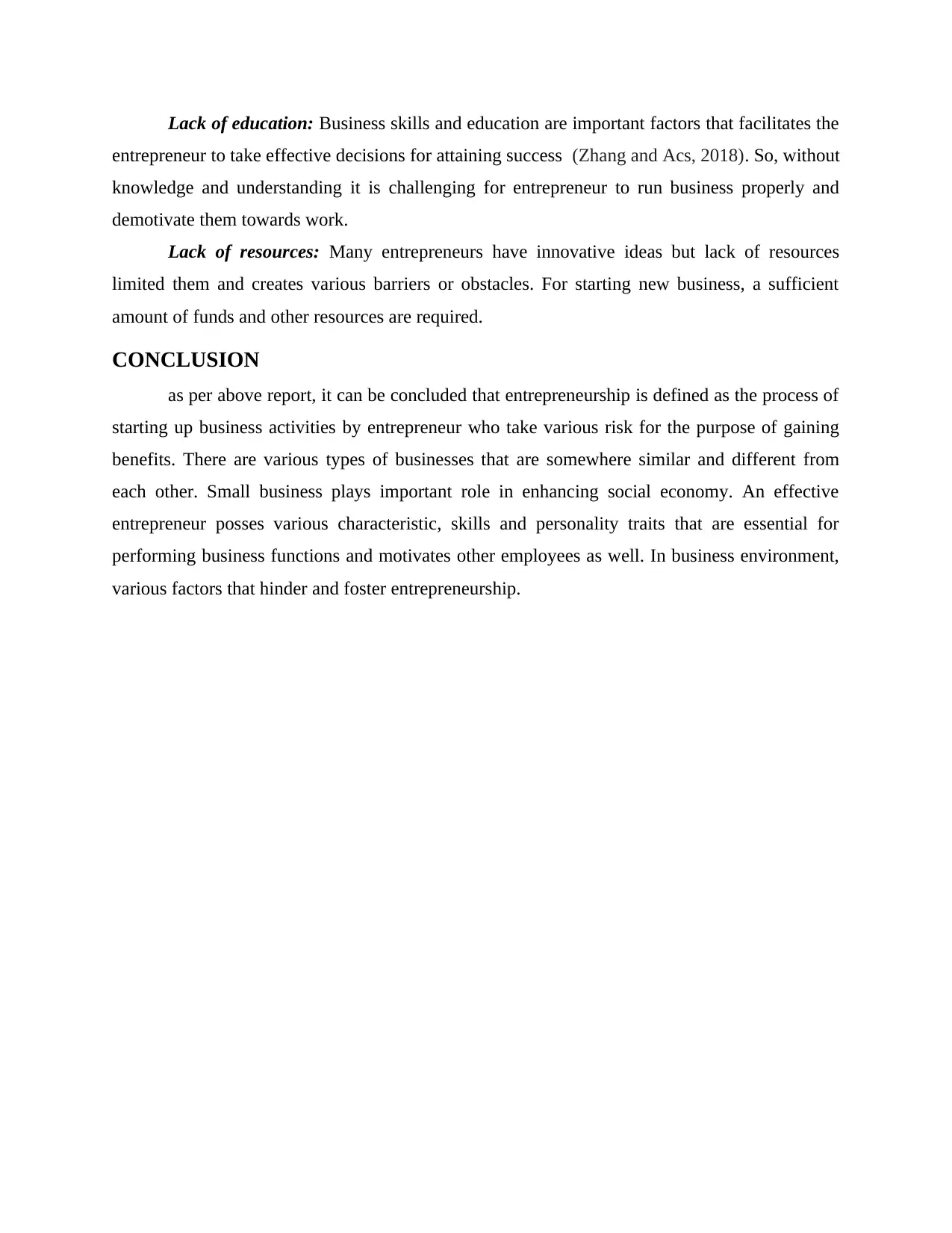
Lack of education: Business skills and education are important factors that facilitates the
entrepreneur to take effective decisions for attaining success (Zhang and Acs, 2018). So, without
knowledge and understanding it is challenging for entrepreneur to run business properly and
demotivate them towards work.
Lack of resources: Many entrepreneurs have innovative ideas but lack of resources
limited them and creates various barriers or obstacles. For starting new business, a sufficient
amount of funds and other resources are required.
CONCLUSION
as per above report, it can be concluded that entrepreneurship is defined as the process of
starting up business activities by entrepreneur who take various risk for the purpose of gaining
benefits. There are various types of businesses that are somewhere similar and different from
each other. Small business plays important role in enhancing social economy. An effective
entrepreneur posses various characteristic, skills and personality traits that are essential for
performing business functions and motivates other employees as well. In business environment,
various factors that hinder and foster entrepreneurship.
entrepreneur to take effective decisions for attaining success (Zhang and Acs, 2018). So, without
knowledge and understanding it is challenging for entrepreneur to run business properly and
demotivate them towards work.
Lack of resources: Many entrepreneurs have innovative ideas but lack of resources
limited them and creates various barriers or obstacles. For starting new business, a sufficient
amount of funds and other resources are required.
CONCLUSION
as per above report, it can be concluded that entrepreneurship is defined as the process of
starting up business activities by entrepreneur who take various risk for the purpose of gaining
benefits. There are various types of businesses that are somewhere similar and different from
each other. Small business plays important role in enhancing social economy. An effective
entrepreneur posses various characteristic, skills and personality traits that are essential for
performing business functions and motivates other employees as well. In business environment,
various factors that hinder and foster entrepreneurship.

REFERENCES
Books and Journals
Fuller-Love, N., 2020. Absolute Essentials of Entrepreneurship. Routledge.
Omojola, T. R., 2019. Marketing Education: A Critical Factor in Reducing Unemployment and
Entrepreneurship Failure in Developing Economies. Marketing, 5(2).
Santos, S. C., Neumeyer, X. and Morris, M. H., 2019. Entrepreneurship education in a poverty
context: An empowerment perspective. Journal of Small Business Management, 57,
pp.6-32.
Sar, A. K., 2017. The influence of management education on entrepreneurship success. Journal
of Entrepreneurship Education, 20(2), pp.1-17.
Galvão, A., Marques, C. S. and Ferreira, J., 2019. Evaluation of an entrepreneurship training
programme: a proposal for new guidelines. Education+ Training.\
Jones, P., Maas, G. and Pittaway, L., 2017. New perspectives on entrepreneurship education.
In Entrepreneurship Education. Emerald Publishing Limited.
Cieślik, J., 2017. Essence of Entrepreneurship. In Entrepreneurship in Emerging Economies (pp.
13-39). Palgrave Macmillan, Cham.
Ratten, V. and Ferreira, J.J., 2017. Future research directions for cultural entrepreneurship and
regional development. International Journal of Entrepreneurship and Innovation
Management, 21(3), pp.163-169.
Chatmi, A. and Elasri, K., 2018. Entrepreneurship and knowledge spillovers from FDI and
exports concentration, diversification. International Journal of Entrepreneurship and
Small Business, 35(4), pp.485-510.
Zaryab, A. and Saeed, U., 2018. Educating entrepreneurship: a tool to promote self
employability. International Journal of Entrepreneurship and Small Business, 35(2),
pp.143-161.
Puspa Liza, G., Mohamad Zulkifli, A. R. and Dede Ansyari, G., 2017. Strengthen and weakness
of modeling in women entrepreneurship of small and medium scale enterprises.
Farinha, L., Ferreira, J. J. and Nunes, S., 2018. Linking innovation and entrepreneurship to
economic growth. Competitiveness Review: An International Business Journal.
Galvão, A., Ferreira, J. J. and Marques, C., 2018. Entrepreneurship education and training as
facilitators of regional development: A systematic literature review. Journal of Small
Business and Enterprise Development.
Rubin, Y., Lednev, M. and Mozhzhukhin, D., 2018. Entrepreneurship education in action: a
matrix of competencies for a bachelor’s degree program. In Annals of Entrepreneurship
Education and Pedagogy–2018. Edward Elgar Publishing.
Books and Journals
Fuller-Love, N., 2020. Absolute Essentials of Entrepreneurship. Routledge.
Omojola, T. R., 2019. Marketing Education: A Critical Factor in Reducing Unemployment and
Entrepreneurship Failure in Developing Economies. Marketing, 5(2).
Santos, S. C., Neumeyer, X. and Morris, M. H., 2019. Entrepreneurship education in a poverty
context: An empowerment perspective. Journal of Small Business Management, 57,
pp.6-32.
Sar, A. K., 2017. The influence of management education on entrepreneurship success. Journal
of Entrepreneurship Education, 20(2), pp.1-17.
Galvão, A., Marques, C. S. and Ferreira, J., 2019. Evaluation of an entrepreneurship training
programme: a proposal for new guidelines. Education+ Training.\
Jones, P., Maas, G. and Pittaway, L., 2017. New perspectives on entrepreneurship education.
In Entrepreneurship Education. Emerald Publishing Limited.
Cieślik, J., 2017. Essence of Entrepreneurship. In Entrepreneurship in Emerging Economies (pp.
13-39). Palgrave Macmillan, Cham.
Ratten, V. and Ferreira, J.J., 2017. Future research directions for cultural entrepreneurship and
regional development. International Journal of Entrepreneurship and Innovation
Management, 21(3), pp.163-169.
Chatmi, A. and Elasri, K., 2018. Entrepreneurship and knowledge spillovers from FDI and
exports concentration, diversification. International Journal of Entrepreneurship and
Small Business, 35(4), pp.485-510.
Zaryab, A. and Saeed, U., 2018. Educating entrepreneurship: a tool to promote self
employability. International Journal of Entrepreneurship and Small Business, 35(2),
pp.143-161.
Puspa Liza, G., Mohamad Zulkifli, A. R. and Dede Ansyari, G., 2017. Strengthen and weakness
of modeling in women entrepreneurship of small and medium scale enterprises.
Farinha, L., Ferreira, J. J. and Nunes, S., 2018. Linking innovation and entrepreneurship to
economic growth. Competitiveness Review: An International Business Journal.
Galvão, A., Ferreira, J. J. and Marques, C., 2018. Entrepreneurship education and training as
facilitators of regional development: A systematic literature review. Journal of Small
Business and Enterprise Development.
Rubin, Y., Lednev, M. and Mozhzhukhin, D., 2018. Entrepreneurship education in action: a
matrix of competencies for a bachelor’s degree program. In Annals of Entrepreneurship
Education and Pedagogy–2018. Edward Elgar Publishing.
⊘ This is a preview!⊘
Do you want full access?
Subscribe today to unlock all pages.

Trusted by 1+ million students worldwide
1 out of 13
Related Documents
Your All-in-One AI-Powered Toolkit for Academic Success.
+13062052269
info@desklib.com
Available 24*7 on WhatsApp / Email
![[object Object]](/_next/static/media/star-bottom.7253800d.svg)
Unlock your academic potential
Copyright © 2020–2026 A2Z Services. All Rights Reserved. Developed and managed by ZUCOL.





